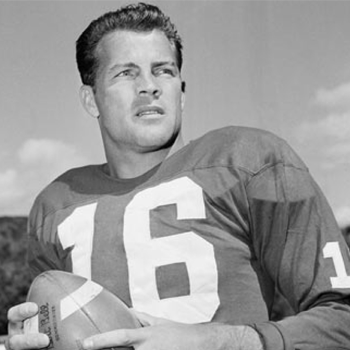Who is Frank Gifford?
Well, if you don’t know…you just might be in the wrong industry.
Francis Newton “Frank” Gifford was a successful American football player and sportscaster.
He was well-known for his 13 year run in the NFL with the New York Giants.
Even more so, he was applauded for his versatility on the football field. He played both sides of the bowl – offense and defense.
His resume was plentiful with five NFL championship games (one of which he won), eight pro bowls and he was awarded MVP in 1956.
Following his NFL career he was inducted into the Pro Football Hall of Fame in 1977.
But, that didn’t stop him from pursuing other opportunities.
After his football career, he became a sports commentator and announcer for NFL football games on CBS and – as you might already know – ABC’s Monday Night Football.
What a guy, right?
Motivated. Talented. Versatile. A true American legend.
It gets better:
He was always willing to do what it took to ensure the success of his team – always!
Today, we choose not to mourn his passing on August 9th…
…We celebrate his success.
Today, we learn from his #1 lesson that all stadium managers can employ as professionals – Being an adaptable and versatile team player all the time.
Frank Gifford Embodies What it Means to Be an Adaptable and Versatile Team Player
Gifford did anything to help his team.
It might be a simple concept, but it’s certainly a hefty responsibility to volunteer for.
He was cross-trained as a professional.
Known for his ability to play multiple positions, at times, Gifford played both running back and wide receiver.
These are two complex and demanding positions and he excelled in both.
Yes, he was a naturally talented player, but he invested time into strengthening his abilities as a professional to guarantee the success of his whole team.
His flexibility and versatility did not stop there.
Throughout his career he threw 14 touchdowns for the most of any non-quarterback.
You read correctly. He wasn’t even a quarterback.
Astounding, right? His commitment solidifies what a team player can accomplish alone.
But:
Can you imagine what a whole team of ‘flexibility’ and ‘versatility’ can accomplish?
Imagine what your team could accomplish if it were staffed with flexible and versatile professionals.
Imagine your team’s potential success.
…Imagine your peace of mind.
How Stadium Managers Become Adaptable and Versatile Professionals
We get it:
There’s a difference between Gifford’s career as a professional American football player and your role as a stadium manager.
However, the underlining lesson and takeaway is that to ensure the best possible outcome for your operation you need to have an adaptable, nimble and knowledgeable staff.
Is that fair to say? We think so.
Keep reading, because we’re going to show you what it takes and how easy it is to put Frank’s #1 lesson into action today.
How do stadium managers become flexible professionals? Using this notable trifecta below.
- Education
- Role-playing
- Infrastructure
Education
In order to be a successful stadium manager, you have to know what you’re doing and what you’re teaching to your staff.
Continuously building your knowledgebase will help you evolve as a leader. Your team will notice and so will your guests.
You’ve got to tap into resources like IAVM, NCS4, the Stadium Managers Association and the ISS 24/7 Blog to stay on the top of your game.
Because let’s be honest, the details matter. Stellar professionals understand that they must always be invested in learning and educating their staff.
Why do that?
Educating your team gives them the ability to be the “running back” or “wide receiver” when your operation requires.
When you know, you know.
But we all know – knowing is only a third of the trifecta.
Role-Playing
We really like to hone in on role-playing quite often.
From acting out vital scenarios with your team to regularly executing tabletop exercises, the only way to achieve Frank Gifford’s level of success is to practice, practice, and practice some more.
Besides the obvious result of ensuring safer events and achieving peace of mind, role-playing can work wonders for your operation.
- Creates accountability
- Your team feels valued
- It challenges your team to test their skills and abilities
- Role-playing builds everyone’s confidence for the long term
- Now you have the flexibility to produce more possible outcomes and solutions
- Awareness of everything occurring at your stadium is drastically enhanced
- Maximum productivity is prevalent amongst your team
- Your credibility as a leader is strengthened
Now:
We’ve drilled deeper into role-playing in another article we’ve written. You should definitely read it. It’s called 9 Reasons You Should Invest in Role-Playing for Safer Events and you can get to it by clicking here.
One more thing…look at role-playing as analytics for people. Continuous improvement and success is how you’ll be inducted into the Stadium Managers Hall of Fame. (We’re sure it won’t be too much longer until someone introduces that anyway.)
Infrastructure
Your infrastructure is your foundation for everything operational.
We saved this for last to make an important point. You can have all the skills and knowledge in the world, but if you don’t have a means to channel your abilities effectively you’ll never achieve peace of mind.
Putting the right infrastructure in place includes identifying your operation’s framework. It’s all in your infrastructure.
Consider these questions:
- How does your operation communicate?
- What are your protocols for handling specific incidents or issues?
- Who will be overseeing back-of-house/front-of-house operations?
- What data do you need for maximizing efficiency and effectiveness?
- How long does it take to get on-scene to an incident?
We have plenty more where these came from, but you understand where we are going. Having your infrastructure in place ensures your ability to answer the questions above and to do so confidently.
You can know everything, practice until you and your team turn as blue as our logo, but if you don’t have the foundation and guidelines in place…you’ll be treading water today and every day into the future.
Putting a solid infrastructure in place also lets you adapt to the ever-changing needs of this industry. From active shooters to drones, you’ll be ready for what’s coming.
Are you struggling to put a solid infrastructure in place? Don’t fret. Click here to read our popular article on why an infrastructure is essential to your incident management process.
Over to You
Harness your ability to become a versatile stadium manager today. Educate your team so they can be the most knowledgeable in the industry, practice like your guests depend on it (because they do!) and lay the foundation for achieving the kind of success Frank Gifford did.
So, are you going to employ Frank Gifford’s #1 lesson of being an adaptable and versatile team player?


